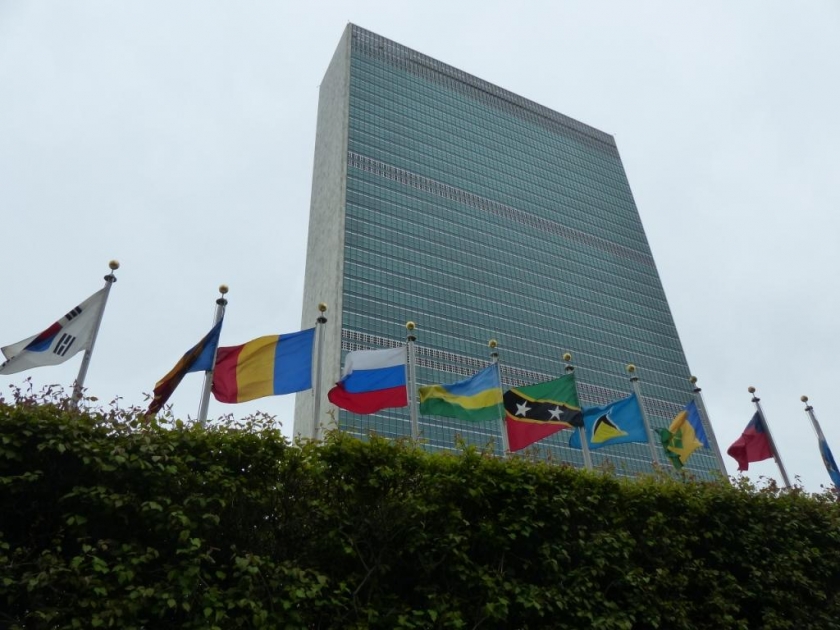Statement by the Representative of the Russian Federation to the First committee of the 72nd session of the UN General Assembly Vladimir Yermakov In the First committee on “Conventional weapons” cluster
Mr. Chairman,
The Convention on Certain Conventional Weapons (CCW) is of great importance for the modern world that features a unique balanced account of both humanitarian concerns and legitimate defense interests of States.
Russia fully implements its obligations under the CCW. We consistently call for strengthening and globalization of the CCW and its Protocols.
We are satisfied with the outcome of the Fifth CCW Review Conference, which confirmed that the Convention remains an effective instrument of international law in the area of control on certain types of conventional weapons. Despite some radical calls, the realistic approach of the State Parties prevailed and it was reflected in the final documents.
Any new arrangements within the framework of the CCW can be elaborated only through hard expert work on a balanced basis and provided that those will not undermine the time-tested core CCW provisions. Therefore, we are not rather enthusiastic with regard to the discussion on quite a premature topic of “lethal autonomous weapon systems” (LAWS). The work of the GGE on LAWS should be based on the principles of phased advancement without any attempts to accelerate the progress and definitely without attempts to impose preventive limitations or prohibitions on this type of prospective weapons and relevant technologies.
As for the issues of use of explosive weapons in populated areas, most concerns in this regard are already addressed by the existing provisions of the IHL and do not require any additional binding measures. What is needed is strict compliance with the existing IHL obligations.
We share the goals and principals of the Anti-Personnel Mines Convention (Ottawa Convention). We highly appreciate the efforts of Belarus which completed under Article 4 of the Ottawa Convention the elimination of 3.4 million APMs of PFM-1 type that had remained on its territory from the Soviet times.
We do not exclude our possible accession to Ottawa Convention in the future. In the meantime Russia continues work to address a number of technical, organizational and financial issues related to implementation of Ottawa Convention.
Russia also is undertaking effective measures to minimize the mine threat. Within the CCW framework Russia faithfully implements its obligations under Amended Protocol 2. Russia has ceased production of the most dangerous blast-type APMs. Russia provides significant assistance in demining and destruction of mine stockpiles to other States. The most vivid example of these efforts are the unprecedented in scope and complexity demining operations in Syrian cities of Palmira and Aleppo.
We note with great regret that the information on alleged violations of Ottawa Convention is not verified at all. As we can see with regard to events in Ukraine the UN Secretary General investigation mechanism envisaged by Ottawa Convention remains inactive. Moreover, at the 2015-2016 State Parties meetings no one even tried to question Kiev’s compliance with Ottawa Convention during the civil war that it unleashed in the South-East of the country.
Our assessment of Cluster Munitions Convention (CMC) has not changed. The CMC is a politicized document that tailors the very definition of CMs to the interests of individual states which are trying to preserve their one-sided military and technical advantages. The CMC only proclaims the “ban” on CMs but in fact does not prohibit it. Moreover it artificially qualifies these munitions as “bad” and “good” on the basis of random and unsubstantiated criteria. Indeed, Article 21 de-facto makes null and void all CMC restrictions since it allows its State Parties to participate in joint combat operations together with States non-Parties using any CMs.
We see no point in acceding to the Arms Trade Treaty (ATT) since its standards are considerably lower than those of the Russian legislation in this area. In particular, the ATT lacks the most essential provision – a direct prohibition on arms transfers to non-state actors. Furthermore, the ATT fails to prohibit the unlicensed production of weapons of other States’ origin. There is also no provision on re-export controls. All these loopholes are being extensively used by unfair dealers in arms sales, including States fiercely promoting the ATT. Thus, many ATT State Parties continue their destabilizing supplies of weapons to the conflict zones where those pretty often fall into the hands of terrorists as was the case, for instance, in Syria.
It should be noted that many other responsible UN Member States share Russia’s assessments of the ATT. After initial unsubstantiated and heightened expectations with regard to this rather controversial document a lot of States came to realize its true nature. That’s why no serious expert nowadays dares to talk about the ATT universalization any longer.
Regrettably, the ATT has had practically no effect with regard to illicit traffic of small arms and light weapons (SALW). Many delegations continue to highlight the growth of armed violence not only in conflict zones but in relatively safe areas as well.
Therefore, we attach great importance to the implementation of the UN Program of Action (PoA) on SALW. The potential of the Program is far from being exhausted and much more has to be done to enhance its efficiency.
Strengthening national control over all stages of weapons life-cycle from production to disposal would help reduce risks of illegal spread of SALW. Among other effective control measures – prohibition of SALW transfers to unauthorized end-users, regulation of broker activities, prevention of unauthorized re-export of arms, and cessation of unlicensed production. We continue to pursue all these initiatives within the UN PoA review mechanisms. Some of them were reflected in the final document of the 2016 BMS. In this respect we expect a positive outcome of the 2018 Review Conference under the Presidency of France.
